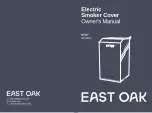
6.
Twist the Alarm clockwise on to the mounting plate to lock in place.
Install and connect all the other Alarms similarly.
Now test the first Alarm by pressing and holding the Test button (this may take up
to 5 seconds). The red indicator light will flash about once every 0.5 seconds and
all Alarms should sound (note: when the test button is released the local Smoke
Alarm will stop sounding but the interconnected Alarms will continue to sound for a
further 3 seconds. This allows one person to check the Alarms are interconnected).
Test all the other Alarms similarly.
Note: These Alarms should be interconnected only within the confines of a single
family living unit. If they are connected between different residences there may be
excessive nuisance alarms. Everybody may not be aware that they are being tested
or that it is a nuisance alarm caused by cooking etc.
5. Testing, Maintenance & Power Supply Monitoring
Your Smoke Alarm is a life saving device and should be checked periodically.
5.1 Manually Testing your Smoke Alarms
It is recommended that you test your Smoke Alarms after installation and then at
least monthly to ensure they are working. It will also help you and your family to
become familiar with the sound of the Alarms.
- Press and hold the Test Button until the Alarm sounds and the red light flashes (see
Figure 7). The Alarm will stop sounding shortly after the button is released.
- If the Smoke Alarms are interconnected using hard-wired connections, check that
all interconnected Alarms sound.
18
















































